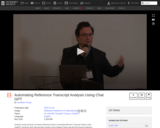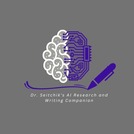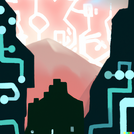
A guidebook for the use of AI in the Computer Science classroom
- Subject:
- Computer Science
- Education
- Material Type:
- Primary Source
- Author:
- Chantelle Bosch
- Date Added:
- 07/17/2024

A guidebook for the use of AI in the Computer Science classroom

Jonathan Young (University of Hawaii at Manoa) presents 'Automating Reference Transcript Analysis using ChatGPT' during the Short Talk and Demo session at the Fantastic Futures ai4LAM 2023 annual conference. This item belongs to: movies/fantastic-futures-annual-international-conference-2023-ai-for-libraries-archives-and-museums-02.
This item has files of the following types: Archive BitTorrent, Item Tile, MP3, MPEG4, Metadata, PNG, Thumbnail, h.264 720P, h.264 IA

Data Science and AI in Psychology is an interactive eTextbook that provides an introduction to data science, big data, and machine learning in psychology. It covers current trends in data science and big data in the field of psychology (Chapter 1), applications of AI in the field of psychology (Chapter 2), the psychology of data visualization (Chapter 3), data ethics (Chapter 4), an introduction to how machines learn (Chapter 5), a hands-on guide for reading and critiquing machine learning research articles that are relevant to psychological topics (Chapters 6 and 7), and an introduction to coding in Python (Chapter 8). This eTextbook also includes an introduction to ChatGPT and tips for using ChatGPT to assist with writing and coding without plagiarizing (Chapters 6 and 8). This is an interactive resource that provides students with opportunities to engage with their peers and develop critical thinking skills through problem-based, active learning.

This guide is intended to be utilized by students to help them use AI to assist in research and to scaffold their writing. Instructors can use it, if they allow AI to be used in their classes, to assist students in their research and writing endeavors. Some screenshots have been redacted for copyright reasons. A paper using this guide is under review and a citation will be provided when available. The guide can assist anyone when writing, especially research papers, but it is geared toward a student population for use in or outside of the classroom. **This guide has been updated with new ways to utilize AI**

Syllabus verbiage or content disclaimer

With the release of ChatGPT in November 2022, the field of higher education rapidly became aware that generative AI can complete or assist in many of the kinds of tasks traditionally used for assessment. This has come as a shock, on the heels of the shock of the pandemic. How should assessment practices change? Should we teach about generative AI or use it pedagogically? If so, how? Here, we propose that a set of open educational practices, inspired by both the Open Educational Resources (OER) movement and digital collaboration practices popularized in the pandemic, can help educators cope and perhaps thrive in an era of rapidly evolving AI. These practices include turning toward online communities that cross institutional and disciplinary boundaries. Social media, listservs, groups, and public annotation can be spaces for educators to share early, rough ideas and practices and reflect on these as we explore emergent responses to AI. These communities can facilitate crowdsourced curation of articles and learning materials. Licensing such resources for reuse and adaptation allows us to build on what others have done and update resources. Collaborating with students allows emergent, student-centered, and student-guided approaches as we learn together about AI and contribute to societal discussions about its future. We suggest approaching all these modes of response to AI as provisional and subject to reflection and revision with respect to core values and educational philosophies. In this way, we can be quicker and more agile even as the technology continues to change.
We give examples of these practices from the Spring of 2023 and call for recognition of their value and for material support for them going forward. These open practices can help us collaborate across institutions, countries, and established power dynamics to enable a richer, more justly distributed emerging response to AI.

As emerging technologies in artificial intelligence continue to evolve, their influence in educational settings is becoming increasingly significant. “The presence of AI systems and chatbots in education needs to be considered as an opportunity of development rather than a threat.” (Kooli, 2023). The primary objective of this guide is to assist you in navigating this new landscape. This guide will equip you to make informed decisions on how to proactively design and adapt your college courses for the age of AI.

Do you need to translate for a Canadian audience? We’ve got you covered! This ebook briefly introduces the concepts of translation and localization and then presents a range of free online tools and resources, including term banks, bilingual concordancers, tools for comparing language varieties, machine translation tools, ChatGPT, and language portals. In each case, the tools and resources that are presented have a distinctly Canadian flavour to help translators to localize texts into Canadian English and Canadian French. For each tool or resource, there is a short practical exercise to get you started. What are you waiting for, eh? (This version supersedes version 1.0: https://oercommons.org/courses/translating-for-canada-eh)

Devez-vous traduire pour un public canadien? Nous avons ce qu’il vous faut! Ce livre numérique aborde brièvement les concepts de traduction et de localisation, puis présente une gamme d’outils et de ressources en ligne gratuits, notamment des banques terminologiques, des concordanciers bilingues, des outils pour comparer des variétés linguistiques, des outils de traduction automatique, le ChatGPT et des portails linguistiques. Dans chaque cas, les outils et les ressources présentés ont une saveur typiquement canadienne pour aider les traductrices et traducteurs à localiser des textes vers l’anglais canadien et le français canadien. Pour chaque outil ou ressource, vous trouverez un petit exercice pratique pour vous aider à démarrer. Alors, vous êtes prêts? (Cette version remplace la version 1 : https://oercommons.org/courses/vous-traduisez-pour-le-canada)